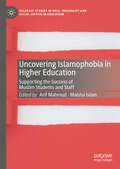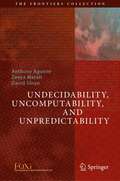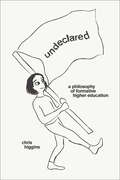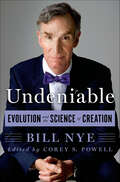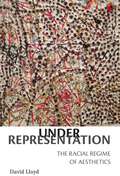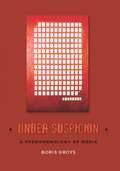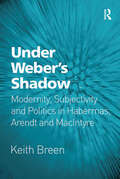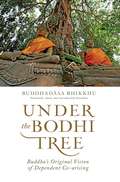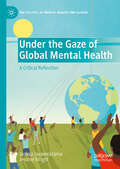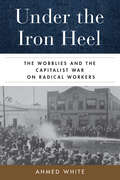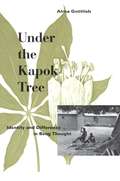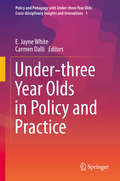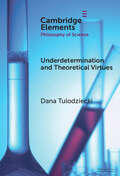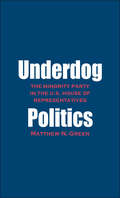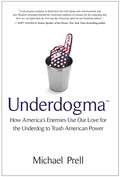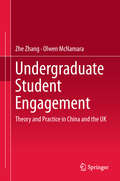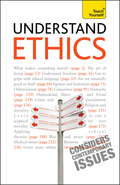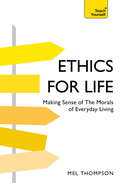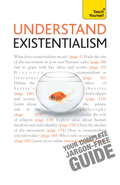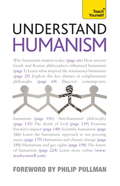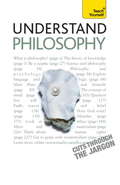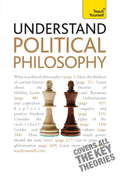- Table View
- List View
Uncovering Islamophobia in Higher Education: Supporting the Success of Muslim Students and Staff (Palgrave Studies in Race, Inequality and Social Justice in Education)
by Arif Mahmud Maisha IslamThis edited collection documents the experiences of Muslim students and staff in UK higher education (HE), including their expertise and experiences in teaching, scholarship, policy and academic transitions as professionals, academics and students. At a time when UK HE at large is attempting to redress myriad racial and social injustices, this collection highlights how this meaningfully applies to Muslim students and staff who find themselves at the nexus of multiple, intersectional oppressions. The chapters presented, all written by Muslim authors, describe the inequalities faced by students and staff at all levels of their educational and professional journeys, exposing the fluid manifestations of Islamophobia within HE structures and institutions. Critically, the book advocates for hope by offering tools that universities and sector bodies can utilise to tackle challenging and nuanced cycles of inequity. This timely volume is essential reading for students, academics, professional service staff, and policymakers leading on diversity, equity and inclusion research, activity and interventions, or those within the sector who wish for it to become more equitable.
Undecidability, Uncomputability, and Unpredictability (The Frontiers Collection)
by Anthony Aguirre Zeeya Merali David SloanFor a brief time in history, it was possible to imagine that a sufficiently advanced intellect could, given sufficient time and resources, in principle understand how to mathematically prove everything that was true. They could discern what math corresponds to physical laws, and use those laws to predict anything that happens before it happens. That time has passed. Gödel’s undecidability results (the incompleteness theorems), Turing’s proof of non-computable values, the formulation of quantum theory, chaos, and other developments over the past century have shown that there are rigorous arguments limiting what we can prove, compute, and predict. While some connections between these results have come to light, many remain obscure, and the implications are unclear. Are there, for example, real consequences for physics — including quantum mechanics — of undecidability and non-computability? Are there implications for our understanding of the relations between agency, intelligence, mind, and the physical world? This book, based on the winning essays from the annual FQXi competition, contains ten explorations of Undecidability, Uncomputability, and Unpredictability. The contributions abound with connections, implications, and speculations while undertaking rigorous but bold and open-minded investigation of the meaning of these constraints for the physical world, and for us as humans.
Undeclared: A Philosophy of Formative Higher Education
by Chris HigginsAn imaginative tour of the contemporary university as it could be: a place to discover self-knowledge, meaning, and purpose.What if college were not just a means of acquiring credentials, but a place to pursue our formation as whole persons striving to lead lives of meaning and purpose? In Undeclared, Chris Higgins confronts the contemporary university in a bid to reclaim a formative mission for higher education. In a series of searching essays and pointed interludes, Higgins challenges us to acknowledge how far our practices have drifted from our ideals, asking: What would it look like to build a college from the ground up to support self-discovery and personal integration? What does it mean to be a public university, and are there any left? How can the humanities help the job-ified university begin to take vocation seriously?Cutting through the underbrush of received ideas, Higgins follows the insight where it leads, clearing a path from the corporate multiversity to the renaissance in higher education that was Black Mountain College and back again. Along the way, we tour a campus bent on becoming a shopping mall, accompany John Dewey through a midlife crisis, and witness the first "happening.&” Through diverse and grounded philosophical engagements, Undeclared assembles the resources to expand the contemporary educational imagination.
Undeniable: Evolution and the Science of Creation
by Bill NyeThe popular scientist explains the marvels and mysteries of evolution in this “fun to read and easy to absorb” New York Times bestseller (The Washington Post).Evolution is one of the most powerful and important ideas ever developed in the history of science. Every question it raises leads to new answers, new discoveries, and new smarter questions. The science of evolution is as expansive as nature itself. It is also the most meaningful creation story that humans have ever found.—Bill NyeSparked by a controversial debate in February 2014, Bill Nye has set off on an energetic campaign to spread awareness of evolution and the powerful way it shapes our lives. In Undeniable: Evolution and the Science of Creation, he explains why race does not really exist; evaluates the true promise and peril of genetically modified food; reveals how new species are born in a dog kennel and in a London subway; takes a stroll through 4.5 billion years of time; and explores the new search for alien life, including aliens right here on Earth.With infectious enthusiasm, Bill Nye shows that evolution is much more than a rebuttal to creationism; it is an essential way to understand how nature works—and to change the world. It might also help you get a date on a Saturday night.“Mr. Nye writes briskly and accessibly [and] makes an eloquent case for evolution.” —The Wall Street Journal“Nye, known for delivering geeky intel with clarity and charm, takes on one of society’s most hotly debated topics (yes, still).” —Time Out New York
Under Representation: The Racial Regime of Aesthetics
by David LloydUnder Representation shows how the founding texts of aesthetic philosophy ground the racial order of the modern world in our concepts of universality, freedom, and humanity. In taking on the relation of aesthetics to race, Lloyd challenges the absence of sustained thought about race in postcolonial studies, as well as the lack of sustained attention to aesthetics in critical race theory.Late Enlightenment discourse on aesthetic experience proposes a decisive account of the conditions of possibility for universal human subjecthood. The aesthetic forges a powerful “racial regime of representation” whose genealogy runs from enlightenment thinkers like Kant and Schiller to late modernist critics like Adorno and Benjamin. For aesthetic philosophy, representation is not just about depiction of diverse humans or inclusion in political or cultural institutions. It is an activity that undergirds the various spheres of human practice and theory, from the most fundamental acts of perception and reflection to the relation of the subject to the political, the economic, and the social.Representation regulates the distribution of racial identifications along a developmental trajectory: The racialized remain “under representation,” on the threshold of humanity and not yet capable of freedom and civility as aesthetic thought defines those attributes. To ignore the aesthetic is thus to overlook its continuing force in the formation of the racial and political structures down to the present. Across five chapters, Under Representation investigates the aesthetic foundations of modern political subjectivity; race and the sublime; the logic of assimilation and the stereotype; the subaltern critique of representation; and the place of magic and the primitive in modernist concepts of art, aura and representation.Both a genealogy and an account of our present, Under Representation ultimately helps show how a political reading of aesthetics can help us build a racial politics adequate for the problems we face today, one that stakes claims more radical than multicultural demands for representation.
Under Suspicion: A Phenomenology of Media (Columbia Themes in Philosophy, Social Criticism, and the Arts)
by Boris GroysThe public generally regards the media with suspicion and distrust. Therefore, the media's primary concern is to regain that trust through the production of sincerity. Advancing the field of media studies in a truly innovative way, Boris Groys focuses on the media's affect of sincerity and its manufacture of trust to appease skeptics.Groys identifies forms of media sincerity and its effect on politics, culture, society, and conceptions of the self. He relies on different philosophical writings thematizing the gaze of the other, from the theories of Heidegger, Sartre, Mauss, and Bataille to the poststructuralist formulations of Lacan and Derrida. He also considers media "states of exception" and their creation of effects of sincerity—a strategy that feeds the media's predilection for the extraordinary and the sensational, further fueling the public's suspicions. Emphasizing the media's production of emotion over the presentation (or lack thereof) of "facts," Groys launches a timely study boldly challenging the presumed authenticity of the media's worldview.
Under Weber’s Shadow: Modernity, Subjectivity and Politics in Habermas, Arendt and MacIntyre
by Keith BreenUnder Weber's Shadow presents an extended critical evaluation of the social and political thought of Jürgen Habermas, Hannah Arendt and Alasdair MacIntyre. Although hailing from very different philosophical traditions, these theorists all take as their starting-point Max Weber's seminal diagnosis of late modernity, the view that the world-historic processes of rationalization and disenchantment are paradoxical in promising freedom yet threatening servitude under the 'iron cage' of instrumental reason. However, each rejects his pessimistic understanding of the grounds and possibilities of political life, accusing him of complicity in the very realities he sought to resist. Seeking to move beyond Weber's monological view of the self, his subjectivism and his identification of the political with domination, they offer alternative, intersubjective conceptions of the subject, ethics and politics that allow for positive future possibilities. But this incontrovertible gain, it is argued, comes at the cost of depoliticizing key arenas of human endeavour and of neglecting the reality of struggle and contestation. Engaging with important current debates and literature, Keith Breen provides a rigorous analysis of the work of Habermas, Arendt, MacIntyre and Weber and a highly accessible and original intervention within contemporary social and political thought. Under Weber's Shadow will therefore be of interest to students and researchers alike within the areas of social and political theory, as well as those within the disciplines of ethics, sociology and philosophy.
Under the Bodhi Tree: Buddha's Original Vision of Dependent Co-arising
by Ajahn Buddhadasa Bhikkhu SantikaroA renowned Buddhist master digs into the idea of interdependency—the very core of the Buddha’s teachings.Under the Bodhi Tree takes us back to the principles at the heart of Buddha’s teachings—conditionality and dependent co-arising. Ajahn Buddhadasa Bhikkhu makes the case for dependent co-arising as a natural law, and builds a compelling presentation from there of Buddhist philosophy, meditation, and practice. Basing himself squarely on the Buddha’s own words as preserved in the Pali Canon, he brings clarity and simplicity to what is typically a thorny philosophical knot. By returning dependent co-arising to its central place in Buddhist theory and practice, Ajahn Buddhadasa provides perspective on the Buddha’s own insights and awakening. Under the Bodhi Tree is another excellent entry from one of the most renowned Buddhist thinkers of modern times. For students who wish to study further, a companion guide is available from liberationpark.org.
Under the Gaze of Global Mental Health: A Critical Reflection (The Politics of Mental Health and Illness)
by Janaka Jayawickrama Jerome WrightThis book critically examines how the globalisation of mental health through the dominant medical model has created barriers to understanding and responding to distress with reference to cases from Malawi and Sri Lanka. Its authors argue that mental health must be understood within the overall health of an individual, and individual health is located within the social, political, cultural, economic, and environmental context in which they live. Their analyses demonstrate that supplanting locally developed responses to distress with a Western medicalised model of mental health inhibits a meaningful engagement with individuals and communities in need of care. Further, they argue that this &‘supplanting&’ is analogous with a colonial endeavour, and one which diverts attention from the real problems of development. Across contexts the book highlights the difficulties that mental health professionals face in facilitating individuals&’ capacities within structurally damaging socio-economic environments and increasingly commercially orientated health systems. This book will appeal in particular to students, researchers and practitioners working across the fields of mental health, medical anthropology, social work, and health and development studies.
Under the Iron Heel: The Wobblies and the Capitalist War on Radical Workers
by Ahmed WhiteA dramatic, deeply researched account of how legal repression and vigilantism brought down the Wobblies—and how the destruction of their union haunts us to this day. In 1917, the Industrial Workers of the World was rapidly gaining strength and members. Within a decade, this radical union was effectively destroyed, the victim of the most remarkable campaign of legal repression and vigilantism in American history. Under the Iron Heel is the first comprehensive account of this campaign. Founded in 1905, the IWW offered to the millions of workers aggrieved by industrial capitalism the promise of a better world. But its growth, coinciding with World War I and the Russian Revolution and driven by uncompromising militancy, was seen by powerful capitalists and government officials as an existential threat that had to be eliminated. In Under the Iron Heel, Ahmed White documents the torrent of legal persecution and extralegal, sometimes lethal violence that shattered the IWW. In so doing, he reveals the remarkable courage of those who faced this campaign, lays bare the origins of the profoundly unequal and conflicted nation we know today, and uncovers disturbing truths about the law, political repression, and the limits of free speech and association in class society.
Under the Kapok Tree
by Alma GottliebIn this companion volume to Parallel Worlds, Alma Gottlieb explores ideology and social practices among the Beng people of Côte d'Ivoire. Employing symbolic and postmodern perspectives, she highlights the dynamically paired notions of identity and difference, symbolized by the kapok tree planted at the center of every Beng village. "This book merits a number of readings. . . . An experiment in ethnography that future projects might well emulate. " —Clarke K. Speed, American Anthropologist "[An] evocative, rich ethnography. . . . Gottlieb does anthropology a real service. " —Misty L. Bastian, American Ethnologist "Richly detailed. . . . This book offers a nuanced descriptive analysis which commands authority. " —Elizabeth Tonkin, Man "Exemplary. . . . Gottlieb's observations on identity and difference are not confined to rituals or other special occasions; rather she shows that these principles emerge with equal force during daily social life. " —Monni Adams, Journal of African Religion "[An] excellent study. " —John McCall, Journal of Folklore Research
Under-three Year Olds in Policy and Practice (Policy and Pedagogy with Under-three Year Olds: Cross-disciplinary Insights and Innovations)
by Carmen Dalli E. Jayne WhiteThe first book in the series Policy and Pedagogy with Under-three year olds: Cross Disciplinary insights and innovations establishes a path for the much-needed examination of the experiences of infants and toddlers in contemporary educational settings across the globe. Bringing together internationally renowned scholars in the field, it starts a series of discussions about the positioning of under-three year olds in contemporary practice and policy contexts. It takes an in-depth look at what this means for our understanding of under-three year olds and those who share their worlds. Featuring some of the most important contemporary topics in this pedagogical domain, such as care, well-being, belonging, professionalism and status, the contributors offer a kaleidoscope of perspectives for contemplating the new normality of very young children living their lives in group-based early childhood settings, and what gives rise to their current realities. It also explores some important policy directions and trends.
Underdetermination and Theoretical Virtues (Elements in the Philosophy of Science)
by Dana TulodzieckiThis Element advances a novel view – the Epistemic Labour View – about the role, limits, and potential of the theoretical virtues as the arbiters of various versions of underdetermination. A central focus is to go beyond the often abstract discussions in this area and to show how the theoretical virtues can illuminate and resolve issues surrounding actual cases of underdetermination found in scientific practice. This title is also available as Open Access on Cambridge Core.
Underdog Politics
by Matthew N. GreenFollowing its publication in 1974, Grant Gilmore's compact portrait of the development of American law from the eighteenth century to the mid-twentieth century became a classic. In this new edition, the portrait is brought up to date with a new chapter by Philip Bobbitt that surveys the trajectory of American law since the original publication. Bobbitt also provides a Foreword on Gilmore and the celebrated lectures that inspired The Ages of American Law. "Sharp, opinionated, and as pungent as cheddar. "#151;New Republic "This book has the engaging qualities of good table talk among a group of sophisticated and educated friends#151;given body by broad learning and a keen imagination and spiced with wit. "#151;Willard Hurst
Underdog Politics
by Matthew N. GreenIn the first comprehensive study of the subject in decades, political scholar Matthew Green disputes the conventional belief that the minority party in the U.S. House of Representatives is an unimportant political player. Examining the record of the House minority party from 1970 to the present, and drawing from a wide range of quantitative and qualitative data, Green shows how and why the minority seeks to influence legislative and political outcomes and demonstrates that the party's efforts can succeed. The result is a fascinating appreciation of what the House minority can do and why it does it, providing readers with new insights into the workings of this famously contentious legislative chamber.
Underdogma: How America's Enemies Use Our Love for the Underdog to Trash American Power
by Michael Prell&“Analyzing and refuting the common assumptions of anti-Americanism is a critical contribution to the global political debate. Thank goodness for this effort." —UN Ambassador John Bolton, author of Surrender is Not an Option David versus Goliath, the American Revolutionaries, "The Little Engine That Could," Team USA's "Miracle on Ice," the Star Wars Rebel Alliance, Rocky Balboa, the Jamaican bobsled team and the meek inheriting the Earth. Everyone, it seems, loves an underdog. Why is that? We begin life tiny and helpless, at the mercy of those who are bigger and more powerful than us: parents and guardians who tell us what to eat, what to wear, how to behave (even when to sleep and wake up). From childhood into adulthood, we're told what to do by those who wield more power—our parents, teachers, bosses government. So naturally, we have a predisposition to resent the overdogs and root for the little guy. But this tendency, which international political consultant and human rights activist Michael Prell calls &“underdogma," can be very dangerous – both to America and to the world at large. In Underdogma, Prell, who has worked world leaders including Israeli Prime Minister Benjamin Netanyahu, the Australian and Canadian prime ministers and the Dalai Lama, explores our love/hate relationship with power within our culture and our politics. Underdogma explains seeming mysteries such as why: Almost half of Americans blamed President Bush for the attacks of 9/11, even while the American media described the architect of these attacks as &“thoughtful about his cause and craft" and &“folksy." Gays and lesbians protest those who protect gay rights (America, Israel), while championing those who outlaw and execute homosexuals (Palestine). Environmentalists focus their rage on America, even though China is the largest emitter of greenhouse gases. The United Nations elevates countries such as Sudan to full membership on the UN's Commission on Human Rights, even as the ethnic cleansing of Darfur proceeds. Tracing the evolution of this belief system through human history—ancient Greece to Marxism to the dawn of political correctness—Prell shows what continuing with this collective mindset means for our future. While America and its president increasingly exalt the meek and apologize for their power, America's competitors and enemies are moving in a different direction. China is projected to overtake the U.S. economically by 2027 and is ready to move into the position of hegemon, and radical Islamists are looking to extend their global territory, taking any sign of weakness as a chance to attack. America must return to its founding spirit, and underdogma must stop now—our nation depends on it.
Undergraduate Student Engagement: Theory and Practice in China and the UK
by Zhe Zhang Olwen McNamaraThis book focuses on undergraduate student engagement in China and the UK. It offers an innovative perspective on this aspect, which, although pervasive, is not always acknowledged by its users to be complex and multidimensional in nature, firmly rooted in cultural, social and disciplinary norms, and difficult to measure. Competition within the global higher education market has become increasingly intense amongst universities; and the higher education sector in China, currently the largest source of international students, is beginning to compete strongly for its home market. Against this consumerist background, student engagement, with its close relation to positive learning outcomes, is increasingly receiving attention from higher education managers and researchers who seek to improve the quality of their ‘products’.The research study on which the book is based draws on three courses, two in China and one in the UK. It offers a binary perspective across two very different cultures (Western and Confucian) and two very different subject areas (Chinese language and mathematics). The study employs a mixed-methods design and develops a conceptual framework derived from statistical and thematic analysis. An original theoretical lens, combining a bioecological perspective (Bronfenbrenner) and a sociocultural one (Holland et al.’s Figured Worlds), adds further interpretive power to help understand the construct of student engagement.
Understand Ethics: Making Sense of the Morals of Everyday Living
by Mel ThompsonWhether you're a student studying philosophy at any level, or simply want to gain a deeper understanding of this fascinating subject, Understand Ethics is an accessible introduction to all the key theories and thinkers. Fully updated, this latest edition includes contemporary examples and discussion of current debates including terrorism, genetics and the media, helping you to grasp how ethics applies to life today.NOT GOT MUCH TIME?One, five and ten-minute introductions to key principles to get you started.AUTHOR INSIGHTSLots of instant help with common problems and quick tips for success, based on the author's many years of experience.TEST YOURSELFTests in the book and online to keep track of your progress.EXTEND YOUR KNOWLEDGEExtra online articles at www.teachyourself.com to give you a richer understanding of psychology.FIVE THINGS TO REMEMBERQuick refreshers to help you remember the key facts.TRY THISInnovative exercises illustrate what you've learnt and how to use it.
Understand Ethics: Making Sense of the Morals of Everyday Living (Teach Yourself General Ser.)
by Mel ThompsonWe all face questions on an almost daily basis related to truth and post-truth, particularly in the political sphere, terrorism, globalization, immigration and asylum, social responsibility, media and social-media ethics, and gender and LGBT issues. So how do you navigate this minefield? Ethics for Life is an accessible introduction to all the key theories and thinkers. It shows the relevance of ethical ideas and theories to everyday life, emphasizing the way our view of ourselves and the societies we live in is shaped by our moral values and the arguments they are based on.With contemporary examples and discussion of current debates including terrorism, genetics and the media, Ethics for Life will help you grasp how ethics applies to life today.
Understand Existentialism: Teach Yourself (Teach Yourself Educational)
by Mel Thompson Nigel RodgersUnderstand Existentialism breaks down a complex mode of thought into more manageable sections, enabling you to get to grips with the key concepts within the movement. Chart the origins and development of existentialism in a variety of disciplines and learn about significant thinkers from Sartre and De Beauvoir to Beckett and Camus. Whether you are a newcomer or more experienced student, this book will enhance your understanding of a brand of philosophy designed to give meaning and direction amongst the uncertainties of modern life.NOT GOT MUCH TIME?One, five and ten-minute introductions to key principles to get you started.AUTHOR INSIGHTSLots of instant help with common problems and quick tips for success, based on the author's many years of experience.EXTEND YOUR KNOWLEDGEExtra online articles at www.teachyourself.com to give you a richer understanding.THINGS TO REMEMBERQuick refreshers to help you remember the key facts.TRY THISInnovative exercises illustrate what you've learnt and how to use it.and how to use it.
Understand Humanism: Teach Yourself (Teach Yourself General Ser.)
by Mark VernonUnderstand Humanism is the definitive introduction to this diverse and increasingly prominent philosophy. This guide teaches you everything you need to know about humanism, from it's ancient origins and key figures, to humanist answers to pressing modern issues, like climate change and identity politics.NOT GOT MUCH TIME?One, five and ten-minute introductions to key principles to get you started.AUTHOR INSIGHTSLots of instant help with common problems and quick tips for success, based on the author's many years of experience.TEST YOURSELFTests in the book and online to keep track of your progress.EXTEND YOUR KNOWLEDGEExtra online articles at www.teachyourself.com to give you a richer understanding of psychology.FIVE THINGS TO REMEMBERQuick refreshers to help you remember the key facts.TRY THISInnovative exercises illustrate what you've learnt and how to use it.
Understand Humanism: Teach Yourself (Teach Yourself General)
by Mark VernonUnderstand Humanism is the definitive introduction to this diverse and increasingly prominent philosophy. This guide teaches you everything you need to know about humanism, from it's ancient origins and key figures, to humanist answers to pressing modern issues, like climate change and identity politics.NOT GOT MUCH TIME?One, five and ten-minute introductions to key principles to get you started.AUTHOR INSIGHTSLots of instant help with common problems and quick tips for success, based on the author's many years of experience.TEST YOURSELFTests in the book and online to keep track of your progress.EXTEND YOUR KNOWLEDGEExtra online articles at www.teachyourself.com to give you a richer understanding of psychology.FIVE THINGS TO REMEMBERQuick refreshers to help you remember the key facts.TRY THISInnovative exercises illustrate what you've learnt and how to use it.
Understand Philosophy: Teach Yourself (Teach Yourself General Ser.)
by Mel ThompsonThis book is the essential introduction to the history of Western thought. Covering all the key thinkers, both ancient and modern, and all the major branches of philosophy, it will give you new insights about the world we live in. Packed full of examples and clear explanations, and with key terms defined and explained, it is ideal whether you are student looking for a quick refresher or just want to explore this fascinating topic out of personal interest.NOT GOT MUCH TIME?One, five and ten-minute introductions to key principles to get you started.AUTHOR INSIGHTSLots of instant help with common problems and quick tips for success, based on the author's many years of experience.TEST YOURSELFTests in the book and online to keep track of your progress.EXTEND YOUR KNOWLEDGEExtra online articles at www.teachyourself.com to give you a richer understanding of psychology.FIVE THINGS TO REMEMBERQuick refreshers to help you remember the key facts.TRY THISInnovative exercises illustrate what you've learnt and how to use it.
Understand Philosophy: Teach Yourself (Teach Yourself General)
by Mel ThompsonThis book is the essential introduction to the history of Western thought. Covering all the key thinkers, both ancient and modern, and all the major branches of philosophy, it will give you new insights about the world we live in. Packed full of examples and clear explanations, and with key terms defined and explained, it is ideal whether you are student looking for a quick refresher or just want to explore this fascinating topic out of personal interest. NOT GOT MUCH TIME? One, five and ten-minute introductions to key principles to get you started. AUTHOR INSIGHTS Lots of instant help with common problems and quick tips for success, based on the author's many years of experience. TEST YOURSELF Tests in the book and online to keep track of your progress. EXTEND YOUR KNOWLEDGE Extra online articles at www.teachyourself.com to give you a richer understanding of psychology. FIVE THINGS TO REMEMBER Quick refreshers to help you remember the key facts. TRY THIS Innovative exercises illustrate what you've learnt and how to use it.
Understand Political Philosophy: Teach Yourself (Teach Yourself General Ser.)
by Mel ThompsonUnderstand Political Philosophy is an in-depth guide to the philosophers and political ideas who have shaped our society. Quickly and easily get to grips with the key thinkers and theories, from Aristotle to Wollstonecraft, from capitalism to utilitarianism. With exploration of contemporary issues and current debates, this book will put political philosophy in the context of the world we live in today.NOT GOT MUCH TIME?One, five and ten-minute introductions to key principles to get you started.AUTHOR INSIGHTSLots of instant help with common problems and quick tips for success, based on the author's many years of experience.TEST YOURSELFTests in the book and online to keep track of your progress.EXTEND YOUR KNOWLEDGEExtra online articles at www.teachyourself.com to give you a richer understanding of psychology.FIVE THINGS TO REMEMBERQuick refreshers to help you remember the key facts.TRY THISInnovative exercises illustrate what you've learnt and how to use it.
